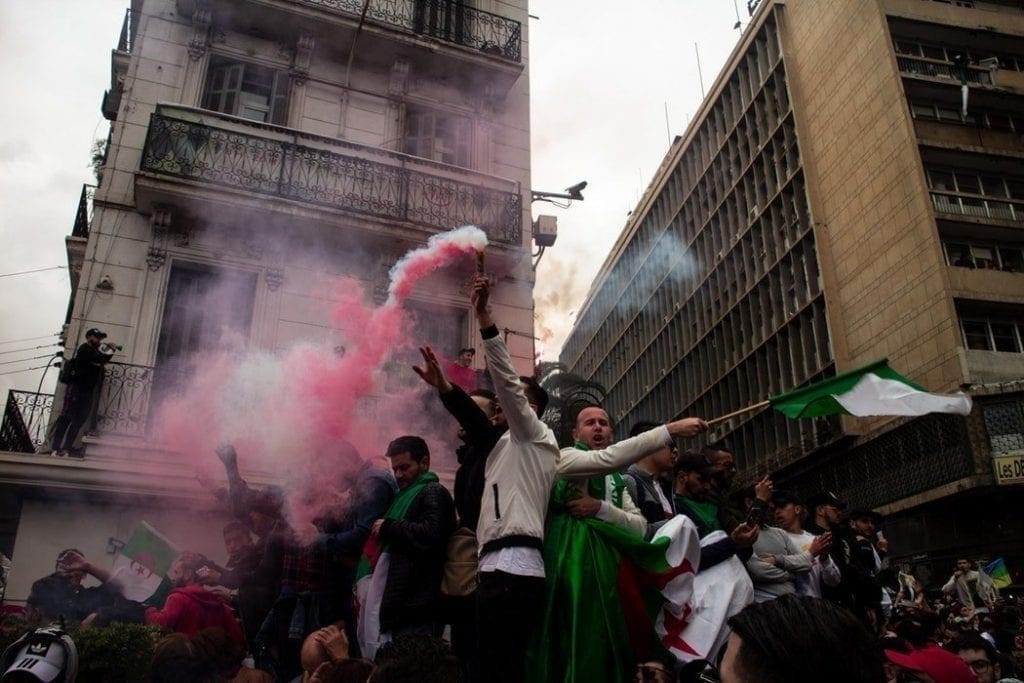Every Friday since Abdelaziz Bouteflika announced his candidacy for a fifth term in February, tens of thousands of Algerians of all backgrounds and ages have been gathering in protest. From football stadiums to the streets and through social media, what are the anthems that make up the soundscapes of protest in Algeria?
From stadiums to the streets: fan chants rally the crowds
Lively criticism and invitations to rally have been heard on the stands of Algeria’s football stadiums for several years now. Faced with controlled public spaces and censored freedom of speech, these have become a forum for promoting the expression of political criticism and social and economic grievances. In the spring of 2018, Ouled El-Bahdja [Children of Algiers], a group of fans from the Sports Union of the Medina of Algiers (USMA), composed “La Casa del Mouradia”. In reference to the Spanish series La Casa de Papel [Money Heist], the song is directly addressed to partisans of the El Mouradia palace, the official residence of the Algerian presidency.
Repeated over and over during protests, this social anthem condemns Abdelaziz Bouteflika’s various mandates one by one: “The first, let’s say it’s over / They’ve had us for a decade / During the second, history became very clear / La Casa d’El Mouradia / During the third, the country looked gaunt / Blame it on personal interests / For the fourth, the doll is dead and nothing has changed…”. Since then, the sports club has released a new song called “Ultima verba”, a direct nod to Victor Hugo’s poem in which the poet scathingly criticised Napoleon III and his corrupt regime. Other examples bear witness to the close links between stadium chants and revolution, such as this song by CS Constantine that addresses housing issues and the cost of living, some of the many barriers to the development of the young generation:
On the web and on the streets: the young generation of artists sets the tone
If fan chants have flooded out of the stadiums, invaded the streets and swept up crowds beyond the stands, they have also attracted the attention of popular music productions. The song “Liberté” by rapper Soolking, featuring Ouled El-Bahdja, has been hugely successful and reached more than 73 million views since mid-March 2019. Its simple and percussive lyrics, beats, violins in the background, auto-tune and choruses of supporters are the perfect recipe for a song that brings everyone together. The lyrics criticise corruption among the elite and hypocrisy in the face of a unified Algerian society inspired by the great figures of anticolonialism: “They thought we were dead, they said ‘Good riddance!’ / They thought we were scared of our dark past / There is no one left, only pictures and lies / Only thoughts that eat us up, all right, take me there / Yes, there is no one left over there, only the people / Che Guevara, Matoub, take me there / I write this one night for a new morning.”
Raja Meziane is a leading figure in this protest soundscape. Discovered on the talent show El Han oua Chabab in 2007, the young artist from Maghnia was driven into exile in the Czech Republic for several years after refusing to be involved with the electoral anthem for President Bouteflika’s fourth term. In her video for “Allo le Système !”, the young rapper makes a disparaging phone call to the system, but there is no answer. By splicing elements from the standard aesthetic of US hip-hop music videos with images of actual protests in the country, her video uses metaphor to show how the government has become corrupt and disconnected from the issues faced by its citizens. Raja Meziane condemns the absence of public and educational infrastructures that forces young Algerians to leave their country: “The country has come to a standstill / worn out / It stays that way / You have destroyed education / and things are out of control. Disabled society / absent culture / the people jump into boats”. The artist also disapproves of the obstruction caused by a ruling power that does not bring any change: “And you believe that you will remain forever / you have buried us alive / and left the dead in power”.
Protest, a tradition at the heart of Algerian music
Beyond the impact of these two songs, the Algerian art scene has taken multiple steps forward in recent weeks. An artists’ collective composed of Jam, Amel Zen, Idir Benaibouche and Aboubakr Maatallah came together at an early stage to work on a song entitled “Libérez l’Algérie” [Release Algeria]. The song calls for “An education for our children”, “An authentic and independent culture” and “A free press”. These claims resonate with the various placards written in French, Arabic and Berber that appear in the music video: “One hero, the people”, “Youth takes control of its destiny”, “In favour of a constitutional state”, “United people, winning people”. This categorically collective action reveals the uprising’s fundamental DNA: peaceful, popular, and with no leaders or ambassadors.
This is not the first time political protest, whether traditional or modern, has come up in Algerian music. Since malhun poetry and other anti-colonialist songs, protest through music has persisted with the development of raï and kabyle political songs. Artists such as Cheb Hasni and Matoub Lounès – both murdered during the “Black Decade” – embodied the political dimension of music in Algeria. From the 90s onwards, the young generation also began making a name for itself on the music scene with groups such as MBS (including MC Donquishoot, Red One and later Diaz) and Intik.
In a long tradition of political music, today’s anthems are woven from a tapestry of football stadiums, social media and music productions, some more alternative than others. Above all, they are the results of a culture of street music improvisation with lyrics sung in Arabic, Berber and French, often humorous and sometimes accompanied by acoustic instruments. For example, this literary and musical creativity carries slogans such as “Jibou El BRI, Jibou Sa3i9aa… makanch el khamssa ya Bouteflika” [“Bring back the Special Forces… There will be no fifth Bouteflika mandate”] from the streets of Algiers to Bechar, from an evening of Berber rhythms to the Facebook pages of the musician brothers TiMoh & Djam.
Many thanks to Anès and Idir for their invaluable help.


